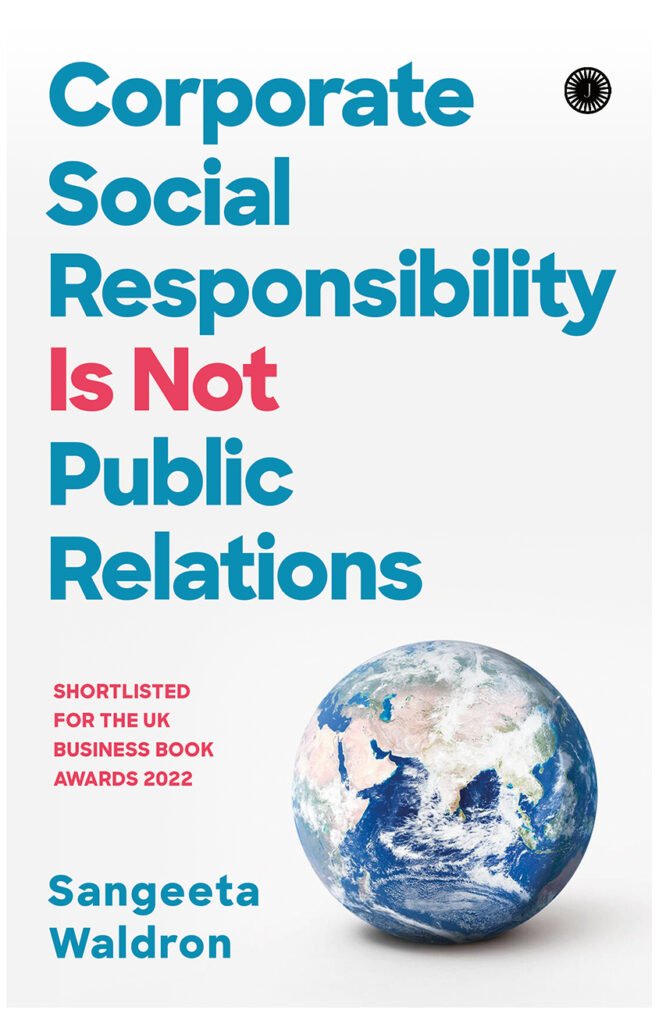By Sangeeta Waldron
Today, in India, Corporate Social Responsibility (CSR) has gone beyond charity and donations, and is now a far more strategic approach, which has become an integral part of the business strategy. Where nearly all leading national and international companies in India are involved in robust CSR programs in areas from education, health, livelihood creation, to the empowerment of women. Good and notable examples are from the Tata Group, Infosys, Bharti Enterprises, ITC Welcome group, Indian Oil Corporation, and I have explored how some of these companies have successfully integrated authentic CSR into their business strategy and brand, in my book, Corporate Social Responsibility Is Not Public Relations, which is published by Jaico Publishing
In developing economies like India, CSR is regarded as part of corporate philanthropy, where companies strengthen social development to support government initiatives. It is important to recognise that the approach and the challenges of CSR in these regions will be different and unique to more developed economies. Plus, over time, the concept of CSR in developing countries, especially in India has changed from a philanthropic approach to being socially responsible to multi stake holders. In 2014 India was the first country to mandate a minimum spend on CSR initiatives and since then, India’s economy is forecast to grow by seven percent this year (2022), making it the fifth largest in the world, according to the International Monetary Fund (IMF), who sees India having the world’s fourth highest GDP by 2027.
However, while India has led the way by being the first country in the world to have implemented a CSR law, it does not come without challenges. Overall, the CSR law has been welcomed as a good government initiative, but there has been a lack of clarity about what should be included in the ‘CSR spend’ and been left to the company to decide. There are other challenges too, and I have highlighted some of the key ones below:
Narrow Perception Towards CSR: Many national companies in India fail to build CSR into the heart of their brand, as a result CSR is not integrated into the business strategy and is seen as a standalone concept. This means that there is no joined up thinking with the brand towards CSR and means there are more risks for things to go wrong with regards to both internal and external communications. Crucially, CSR is not given the due diligence it demands and is still used purely as a marketing tool, which is no longer an accepted by consumers.
Lack Of A Joined Up Approach For CSR Activities: India is a vast country with a predominately rural population, and it is here where a lot of companies concentrate their CSR efforts. However, what studies show, is that there is a lack of interest from local communities to participate and contribute to the CSR activities of companies at grassroots. This is because there have been little efforts from many of these companies to raise awareness about CSR or its purpose in local communities. This issue is further intensified by the lack of communication between the company and the community at grassroots. All this weakens the CSR efforts.
Lack of Transparency: This is perhaps one of the main issues, where the local implementing agencies do not make enough efforts to disclose or share information about their programmes, whether they have been successful or not, nor are audits conducted to show how funds are spent. This lack of transparency negatively impacts the process of trust building between companies and local communities, which is key to the success of any CSR initiative at the local level.
Measurement: This follows on from the lack of transparency – transparency and dialogue can help to create more trustworthy businesses and push forward the standards of organizations at the same time. A key challenge facing business is the need for more reliable CSR indicators and not being afraid to implement them.
Limited Availability of Well Organized Non-Governmental Organizations: This is a challenge which is unique to India, where data shows that there is limited availability of well-organized nongovernmental organizations in remote and rural areas, who have the expertise to assess and identify real needs of the community and work along with companies to ensure successful implementation of CSR activities. This also means there is limited investment in local communities to empower them to undertake their own grassroot development projects.

While we can see that some of the CSR challenges in India are unique to the country, the concept of corporate social responsibility is now firmly rooted in the global business agenda.
It is regarded as an element of success and survival. The challenge is for a company to create a strong, innovative, and authentic CSR strategies, which need to meet all the stakeholders’ objectives. To move from theory to concrete action, a mind shift is needed, as there are still some corporates who use their CSR activities purely as a marketing tool, which means that these companies are probably greenwashing and pretending!






















